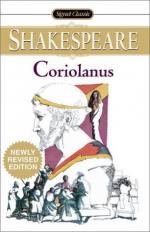|
This section contains 8,623 words (approx. 29 pages at 300 words per page) |

|
Ann C. Christensen, University of Houston
I
Critical responses to Coriolanus tend to concentrate on two dominant issues: the political and the maternal. Approaches to the former typically address the play's representation of the polis, the conflicts between patricians and plebeians, and draw on Shakespeare's historical sources of Plutarch, Livy, and Machiavelli as well as contemporary contexts such as the food shortages and Midlands enclosure uprisings of the early seventeenth century.1 Understandably, maternal issues—from milk to mildness—dominate psychoanalytic and gender studies of the play and focus on Volumnia—her curious attitude towards nurture, her role in forming her son, his responses to "feeding and dependency."2 Of course, neither approach wholly neglects the other.3 Stanley Cavell neatly summarizes the two critical strains while noting that both recognize the play's central concern with nurture: "the play lends itself equally, or anyway naturally, to psychological and to political readings...
|
This section contains 8,623 words (approx. 29 pages at 300 words per page) |

|


